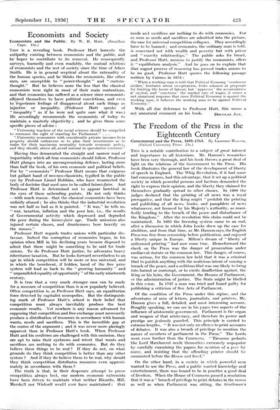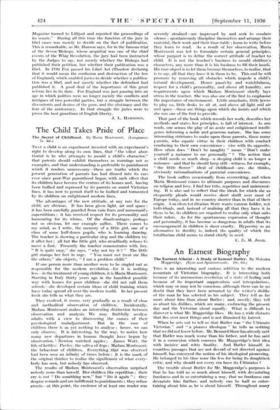The Freedom of the Press in the Eighteenth Century
Tins is a notable contribution to a subject of great interest and importance to all historians. Mr. Hanson's researches have been very thorough, and his book throws a great deal of light on the relations of the Government to the Press. His book illustrates the general law of the development of liberty of speech in England. The Whig Revolution, if it had some bad consequences, had this advantage, that it set up a political society in which powerful persons and factions demanded the right to express their opinion, and the liberty they claimed for themselves gradually spread to other classes. In 1680 the judges declared that the printing of all news was a royal prerogative, and that the King might " prohibit the printing and publishing of all news, books, and pamphlets of news whatsoever, not licensed by his Majesty's authority, as mani- festly tending to the breach of the peace and disturbance of the Kingdom." After the revolution this claim could not be maintained. In 1695 the licensing system came to an end, after a discussion in which John Locke drew up the case for abolition, and from that time, as Mr. Hanson says, the English Press was free from censorship before publication, and enjoyed a liberty unique in Europe. Milton's dream of " liberty of unlicensed printing " had now come true. Henceforward the check on the Press was the danger of prosecution under mediaeval statute or the common law. This danger, of course, was serious, for the common law held that it was a criminal libel to publish anything with the malicious intent of causing a breach of the peace, and a seditious libel was one likely to bring into hatred or contempt, or to excite disaffection against, the King or his heirs, the Government, the Houses of Parliament, or the administration of justice. The State might be libelled in this sense. In 1787 a man was tried and found guilty for publishing a criticism of five Acts of Parliament.
Of the condition of the Press under this regime, and the adventures of men of letters, journalists, and printers, Mr. Hanson gives a full, detailed, and most interesting account. Roughly speaking, we can see in his pages two aspects of the influence of aristocratic government. Parliament is the organ and weapon of that aristocracy, and therefore its power and prestige are jealously guarded. This principle is carried to extreme lengths. " It was not only an offence to print accounts of debates. It was also a breach of privilege to mention the names of members of parliament in the Press." The Lords went even further than the Commons. " Tiresome pedants like Lord Marehmont made themselves extremely unpopular by carefully examining the papers for mention of a peer by name, and insisting that the offending printer should be summoned before the House and fined."
On the other hand, in a society in which powerful men wanted to use the Press, and a 'public wanted knowledge and entertainment, there was bound to be in practice a good deal of freedom. When theHouse of Commons passed a resolution that it was a " breach of privilege to print debates in the recess as well as when Parliament was sitting, the Gentleman's Magazine turned to Lilliput and reported the proceedings of its senate." During all this time the function of the jury. in libel cases was merely to decide on the fact of publication. This is remarkable, as Mr. Hanson says, for in the famous trial of the SevenifBishops, whose acquittal was one of the chief events of the Whig Revolution, the jury had been instructed by the Judges to say, not merely whether the Bishops had published their petition, but whether their publication was a libel. In 1792 Fox passed his Libel Act (Thurlow declaring that it would mean the confusion and destruction of the law of England), which enabled juries to decide whether a publica- tion was a libel, and not merely whether the defendant had published it. A good deal of the importance of this great reform lies in its date. For England was just passing into an age in which politics were no longer merely the conflicts and intrigues of two powerful parties, but- a struggle between the discontents and desires of the poor, and the obstinacy and the fear of the aristocracy. In that struggle the juries were to prove the best guardians of English liberty.
J. L. HAMMOND.













































 Previous page
Previous page